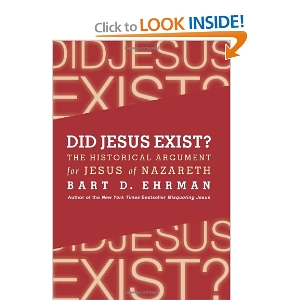In the next few posts we will have a Q and A time with Professor Bart Ehrman about his new Harper book, Did Jesus Exist? which (not surprisingly) has sparked considerable interest. A special thanks to Bart for taking considerable time to answer the questions I sent him.
—-
Q. What prompted you to not merely write Did Jesus Exist? but prioritize it?
A. I had wanted to write the book for some time, for a simple reason. A few years ago I started getting emails from people asking me whether or not I thought Jesus existed. Some of these people indicated that they had heard that I thought Jesus did not exist, and they wanted to know if it was true. In fact, it was nowhere close to being true: I had already written a book in which I argued what I thought we could say with reasonable certainly about the things Jesus said and did (Jesus: Apocayptic Prophet of the New Millennium). And my idea has always been that for Jesus to say and do these things, he had to exist!
In any event, it struck me as important that there was no book-length treatment of the question of Jesus’ existence by someone who was trained in NT and early Christianity, since we NT scholars tend simply to assume that he existed, without feeling any real compulsion to “prove” it. But as I looked into it, I found there was a lot of literature on the other side of the question, mythicists arguing, with an increasing following (especially on the Internet), that Jesus did not in fact exist. And so I wanted to write a book that showed that whatever else one might want to say about Jesus, he certainly existed.
As to why I prioritized it. Well, I try to write three kinds of books: some for scholars, some for college level students (textbooks), and some for a popular audience. My next popular book was going to be on how Jesus became God. That is, how did a relatively unknown preacher from rural Galilee come to be thought of as God – a member of the trinity? It’s a fascinating question, and I don’t think (contrary to what most people think) that the answer is obvious. But it did occur to me that it made better sense to write Did Jesus Exist first, since it doesn’t make sense to talk about how Jesus came to be considered God if he didn’t even live!
Q. In books of this sort, you tend to identify yourself as a historian rather than as a NT scholar, or text critical expert. Is there a particular reason for this?
A. Yes indeed! My training as a NT scholar was largely in theology and exegesis. As a masters student, then a PhD student, at Princeton Theological Seminary, I took course after course in both these fields – especially exegesis. But I also took courses that were focused on early Christian history, starting with Bruce Metzger’s PhD seminar (the first one I had) on the “Canon of the New Testament.”
I was also trained, of course, as a textual critic. But I realized early on in my work in textual criticism that it is impossible really to be competent in that field without having a firm grasp on the history of early Christianity – at least the first three centuries of Christian history, since that is when most textual changes occurred in the manuscripts of the NT, and if you want to understand why the text was changed, you have to know something about the historical circumstances of the scribes who changed it (this need to be historically focused was not as obvious to other textual scholars, although today it is increasingly so). This led me into a deep interest in the history of early Christianity – something that, regrettably, most NT scholars – not just textual critics — are blissfully ignorant about. There is a very unhelpful divide in many PhD programs throughout the world between New Testament and Patristics. But I became deeply interested in both, and have spent most of my career working in both areas (New Testament studies and the history of Christianity up to the early fourth century).
I would say that most of my scholarship over the past twenty years has been more historical in nature than, say, exegetical or theological. I approach textual criticism as a historian (although, obviously, as an exegete as well; a lot of my book Orthodox Corruption of Scripture is straight exegesis; but it is all done from a historical vantage point). And I have written a lot on various aspects of early Christian history. The question whether Jesus existed is not one that exegesis or textual criticism can answer. It is a historical question and needs to be addressed on historical grounds on the basis of historical evidence. That’s why I stress my interest and approach as historical in a book like this.













